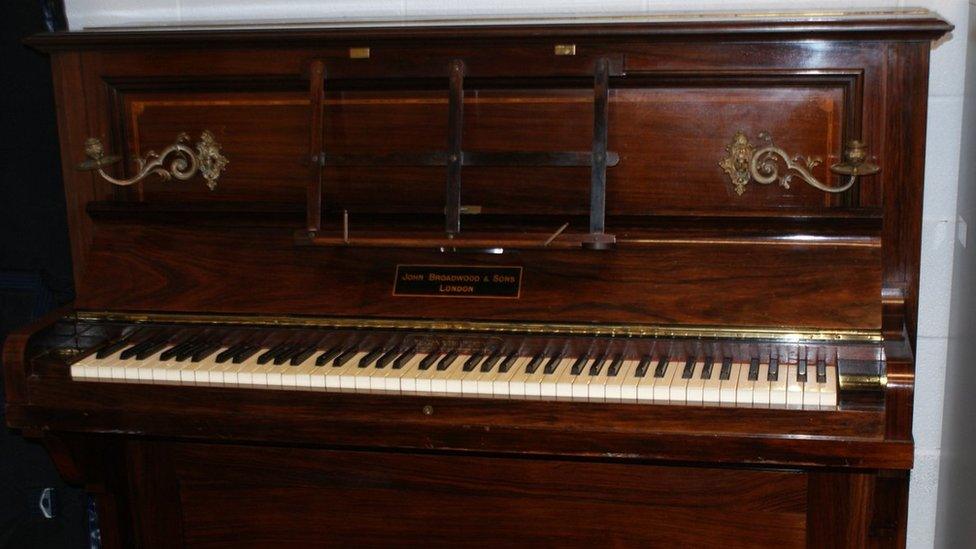Shropshire piano gold coin hoard declared treasure
- Published
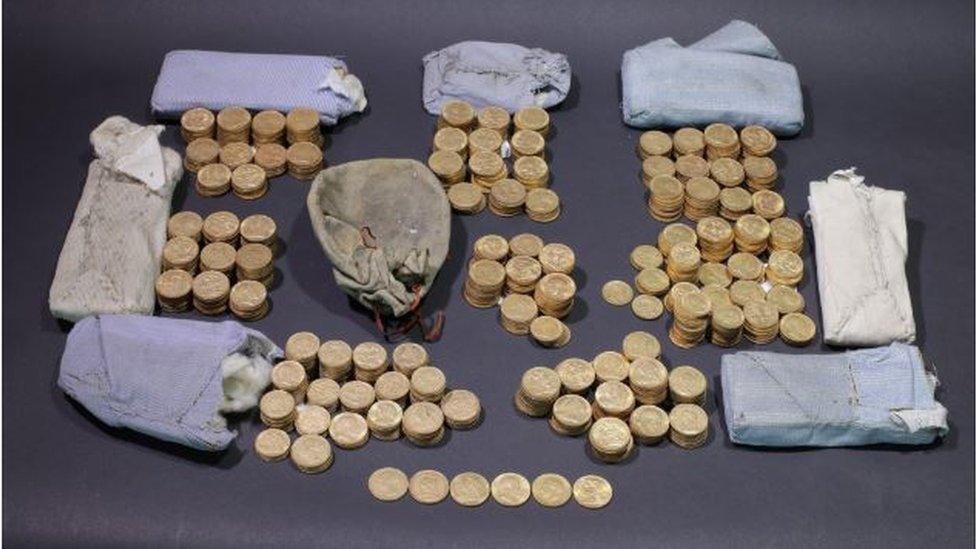
The hoard consists of 913 gold sovereigns and half sovereigns dating from 1847 to 1915
The largest hoard of gold sovereigns in Britain, found hidden in an old piano, has been declared treasure.
The discovery was made in Shropshire before Christmas when the piano's new owners had it retuned and repaired.
Shrewsbury Coroner's Court decided the find qualified as treasure, which means ownership now lies with the Crown. It will be offered for sale to museums.
The tuner who found the hoard and Bishops Castle Community College, which owns the piano, will share a reward.
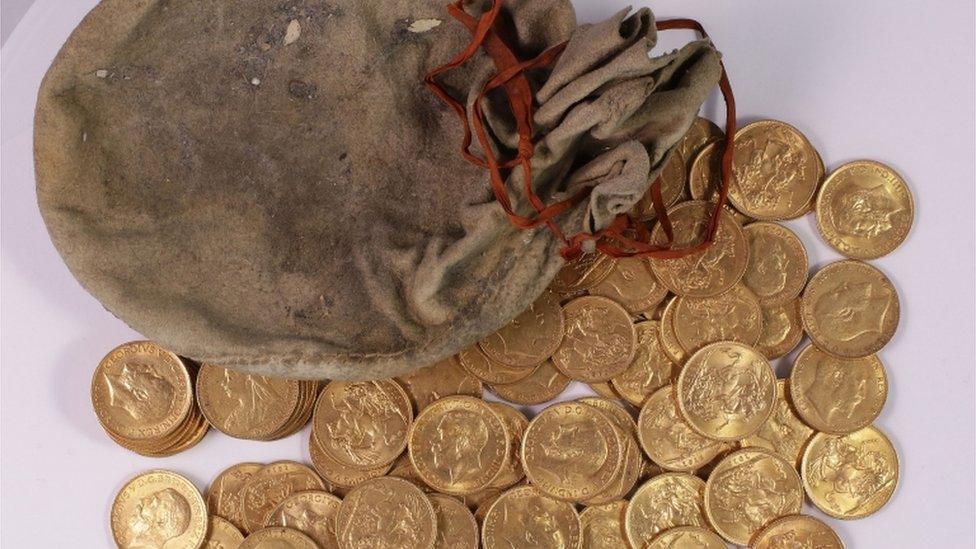
The coins will be offered for sale to museums
There are 913 gold sovereigns and half sovereigns dating from 1847 to 1915, from the reigns of Queen Victoria, Edward VII and George V.
The inquest heard 50 people came forward laying claim to the hoard, but coroner John Ellery ruled their true owner remained unknown.
'An exciting story'
The coins were found under the keyboard of the piano, carefully stitched into seven cloth-bound packets and a single leather drawstring purse, and amount to more than 6kg (13 pounds) of gold bullion.
The hoard's market value will be decided by an independent Treasure Valuation Committee at the British Museum.
Peter Reavill, the British Museum's finds liaison officer for the region, said he expected it to be worth "hundreds of thousands of pounds".
Piano tuner Martin Backhouse, 61, found the "gob-smacking" stash, after initially thinking the packets were bags of "moth repellent".
"The keys were a bit stiff and a bit sluggish, so I took the keys out.
"As soon as I started lifting out the keys, I thought, uh-uh, what's this underneath the keyboard?"
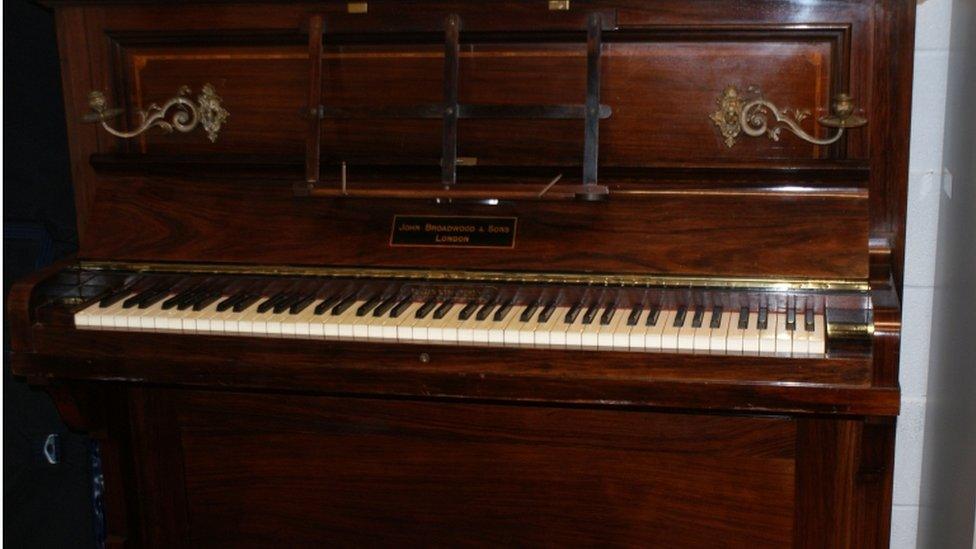
The piano was donated to the college by a local family
He said he opened the packets and thought "oooh, it looks like there's rather a lot of gold in this - I'd never come across anything like this in my whole life".
He said any money from the find would go to his children, but he may retire early.

What is treasure?
Under the Treasure Act 1996, external, finders of potential treasure in England, Wales and Northern Ireland are legally obliged to notify their local coroner
An inquest then determines whether the finds constitute treasure
The act contains a number of definitions of "treasure", including prehistoric objects, coins that contain gold or silver and are at least 300 years old, or more recent valuable objects that have been deliberately hidden
If the find is declared treasure, the finder must offer it for sale to a museum at a price set by the British Museum's Treasure Valuation Committee
A reward is then offered to the finders and other relevant parties

The upright piano was made by Broadwood and Sons of London and sold to two music teachers in Saffron Waldon, Essex in 1906.
After that the piano's history is unknown, until 1983 when it was purchased by the Hemming family in the Saffron Walden area.
They moved to Shropshire and donated the piano to the college last summer to help its students learn to play music.
The oldest coin in the hoard was made in 1847 and the youngest in 1915, suggesting the coins were hidden after this date.
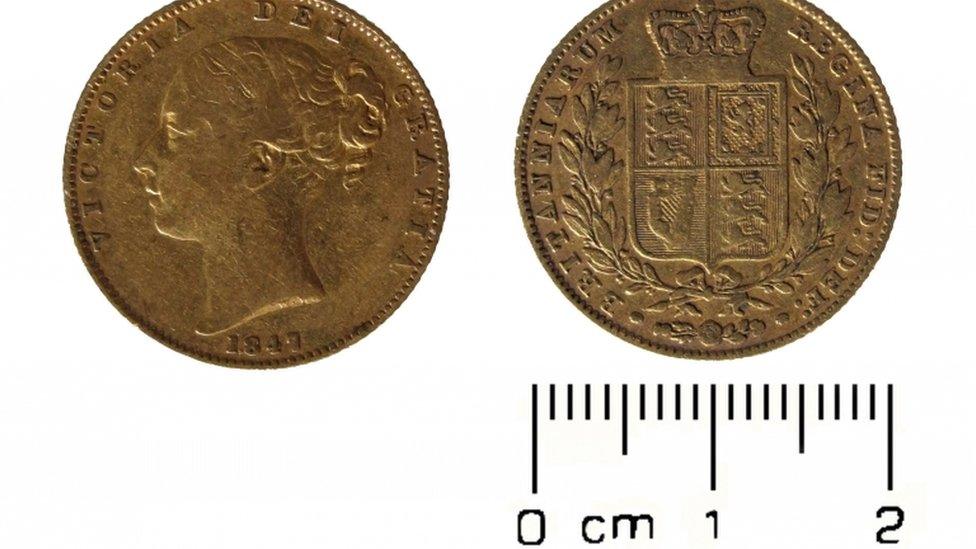
The hoard's market value will be decided by an independent Treasure Valuation Committee at the British Museum
Mr Reavill, from the British Museum, told the hearing the hoard may have been re-packaged some time between 1926 and 1946, because one of the packets contained an old Shredded Wheat advertising card from that era.
He said: "It's been an amazing case to deal with but we have drawn a blank in terms of finding the original owner. We have meticulously gone through all the claims but there is a bar for the evidence and at the moment nobody has reached close to that bar.
"We are not sure of the value but I would expect it to be hundreds of thousands of pounds."
Graham and Meg Hemmings owned the piano for 33 years, unaware of what was inside. They said they were "very happy" the money would go to the college.
"We hope they will do something that benefits the children's musical ability - we feel very strongly about that," Mrs Hemmings said.
She said she felt sad the heirs of the fortune had not been traced. "It's an incomplete story - but it's still an exciting story," she added.
For more stories about historical finds follow BBC England's Pinterest board., external
- Published12 January 2017
